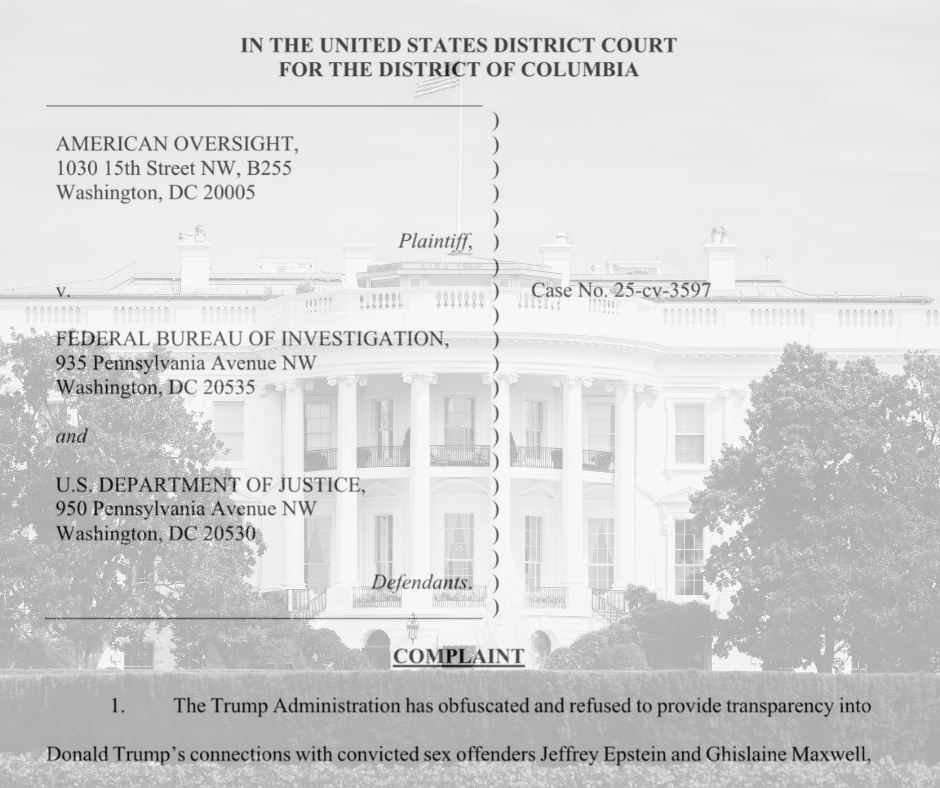American Oversight Sues DOJ and FBI for Records of Any Trump Interviews in Epstein Investigation
We’re challenging the FBI’s refusal to confirm whether President Trump was interviewed.

On Tuesday, we sued the Department of Justice (DOJ) and the Federal Bureau of Investigation (FBI) for any interview records of President Donald Trump in connection with the government’s investigation of convicted sex offender Jeffrey Epstein and his associate Ghislaine Maxwell.
The lawsuit comes two weeks after Arizonans elected Adelita Grijalva, whose swearing-in could provide the decisive signature for a bipartisan discharge petition to force a floor vote on releasing the Epstein files, to Congress — a move Trump opposes and is actively lobbying Republican lawmakers to abandon. Speaker Mike Johnson has yet to schedule Grijalva’s swearing-in.
In July 2020, we filed a Freedom of Information Act (FOIA) request for FBI Form 302s — reports used by agents to summarize witness interviews — and related records documenting any interviews of Trump during the 2006–2008 investigation. That investigation resulted in a controversial non-prosecution agreement with Epstein that was negotiated by then-U.S. Attorney Alex Acosta, who later served in Trump’s first cabinet. The FBI refused to confirm or deny the existence of such records, citing privacy concerns — even though Trump’s ties to Epstein and Maxwell are a matter of longstanding and widespread public record.
Maxwell, who in 2021 was found guilty of conspiring with Epstein to sexually abuse and exploit underage girls, was recently moved to a lower-security federal prison in Texas by the Trump administration. The transfer came just days after she met with Deputy Attorney General Todd Blanche, who previously served as one of Trump’s personal criminal defense attorneys. In 2020, when asked by a reporter whether he expected Maxwell to reveal the names of powerful men tied to Epstein’s alleged sex-trafficking ring, Trump replied that he didn’t know and added, “I just wish her well.”
“The American people deserve to know whether the president of the United States was questioned by federal investigators about his ties to one of the nation’s most notorious sexual predators,” said Chioma Chukwu, Executive Director of American Oversight. “Trump spent years promising transparency in the Epstein case if he returned to office. Instead, he’s wielded the power of the federal government to keep the truth hidden. Real accountability demands full disclosure — and that starts with releasing these records.”
The lawsuit comes amid continued revelations of Trump’s connections to Epstein, including reports that Trump’s name appeared repeatedly in internal government reviews of Epstein-related records and that Trump personally wrote and illustrated a suggestive note included in a book given to Epstein. While Trump has publicly downplayed his relationship with Epstein, he acknowledged in 2002 that Epstein was a “terrific guy” who enjoyed the company of “beautiful women as much as I do, and many of them are on the younger side.”
The complaint, filed in the U.S. District Court for the District of Columbia, asks the court to compel the DOJ and the FBI to conduct adequate searches for responsive records and to release any non-exempt documents.
Our FOIA request specifically sought FBI 302s and other records memorializing interviews of Trump during the Epstein investigation. After the FBI issued a “Glomar” response during the first Trump Administration — neither confirming nor denying the existence of responsive records — we appealed to the DOJ’s Office of Information Policy, which upheld the FBI’s refusal. Having exhausted all administrative remedies, we are now seeking judicial intervention.
Earlier this month, we sued the DOJ and the FBI for failing to release records related to the Trump administration’s controversial review of materials about Epstein, including his connections to the president. That suit seeks to answer unresolved questions about how Attorney General Pam Bondi and FBI Director Kash Patel may have intervened in or steered the review of the Epstein files — and why the process appeared designed to protect Trump by instructing FBI personnel to flag records mentioning the president.